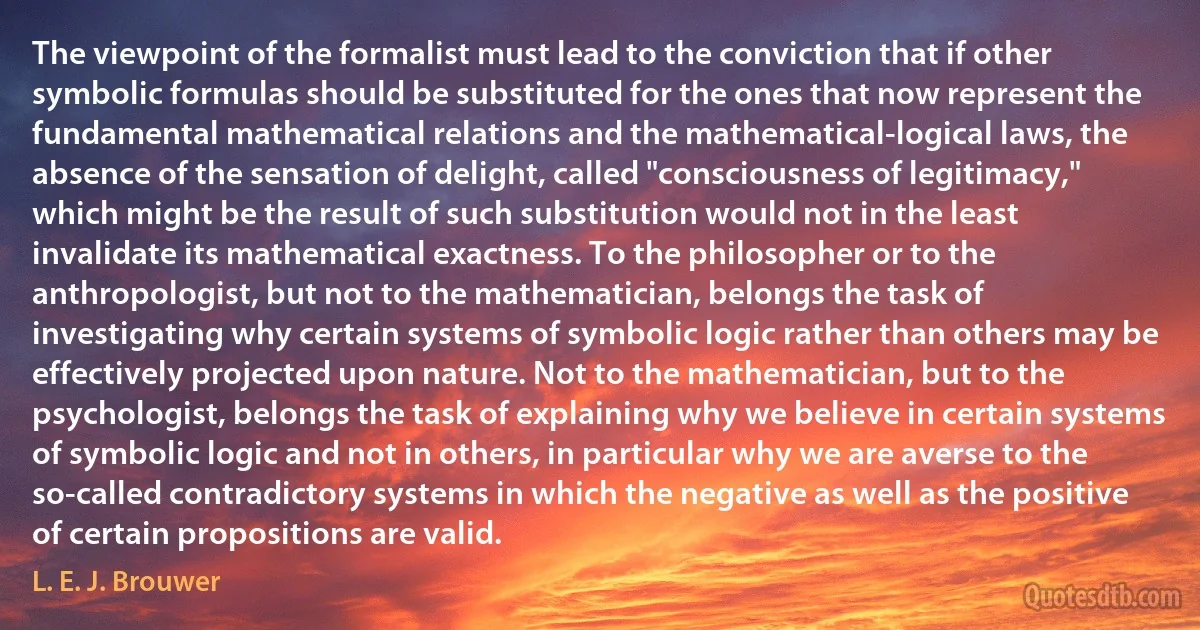
The viewpoint of the formalist must lead to the conviction that if other symbolic formulas should be substituted for the ones that now represent the fundamental mathematical relations and the mathematical-logical laws, the absence of the sensation of delight, called "consciousness of legitimacy," which might be the result of such substitution would not in the least invalidate its mathematical exactness. To the philosopher or to the anthropologist, but not to the mathematician, belongs the task of investigating why certain systems of symbolic logic rather than others may be effectively projected upon nature. Not to the mathematician, but to the psychologist, belongs the task of explaining why we believe in certain systems of symbolic logic and not in others, in particular why we are averse to the so-called contradictory systems in which the negative as well as the positive of certain propositions are valid.
L. E. J. BrouwerRelated topics
absence anthropologist believe certain contradictory delight exactness formalist fundamental lead least legitimacy mathematician might nature now ones psychologist result sensation should substitution task well others relations viewpoint lawsRelated quotes
The innovator, however, must in the first place be discontented, he must doubt the value of what he is doing or question the accepted ways of doing it. And secondly, he must be prepared to take fresh paths, to venture into fields where he is by no means expert. This is true, at least, of major forms of innovation; they make it possible for other men to be expert, but are not themselves forms of expertise. Freud was not an expert psycho-analyst; before Freud wrote there was no such thing; he created the standards by which psycho-analysts are judged expert. Neither was Marx an expert in interpreting history in economic terms nor Darwin an expert in evolutionary biology. If a man is trained, purely and simply, to be expert and contented in a particular task he will not innovate; Freud would have remained an anatomist, Marx a philosopher, Darwin a field-naturalist.

John Passmore
...the principle of the limiting character of the velocity of light. This statement... is not an arbitrary assumption but a physical law based on experience. In making this statement, physics does not commit the fallacy of regarding absence of knowledge as evidence for knowledge to the contrary. It is not absence of knowledge of faster signals, but positive experience which has taught us that the velocity of light cannot be exceeded. For all physical processes the velocity of light has the property of an infinite velocity. In order to accelerate a body to the velocity of light, an infinite amount of energy would be required, and it is therefore physically impossible for any object to obtain this speed. This result was confirmed by measurements performed on electrons. The kinetic energy of a mass point grows more rapidly than the square of its velocity, and would become infinite for the speed of light.

Hans Reichenbach
Doing nothing is not the absence of a policy; it is, in fact, the adoption of one. "Neutrality" favors the side with the biggest arsenal. "Nonintervention" is a form of interference. If you will the end-and President Barack Obama has finally said that Qaddafi should indeed go-then to that extent you will the means...The immediate task is therefore to limit the amount of damage Qaddafi can do and sharply minimize the number of people he can murder. Whatever the character of the successor system turns out to be, it can hardly be worsened if we show it positive signs of friendship and solidarity...I am sure I am not alone in feeling rather queasy about being forced to watch the fires in Tripoli and Benghazi as if I were an impotent spectator. Indifference of this kind to the lives of others can have a coarsening effect. It can lower one's threshold of sympathy. If protracted unduly, it might even become brutalizing.

Christopher Hitchens
Science Of Energetics. Although the mechanical hypothesis just mentioned may be useful and interesting as a means of anticipating laws, and connecting the science of thermodynamics with that of ordinary mechanics, still it is to be remembered that the science of thermodynamics is by no means dependent for its certainty on that or any other hypothesis, having been now reduced, to a system of principles, or general facts, expressing strictly the results of experiment as to the relations between heat and motive power. In this point of view the laws of thermodynamics may be regarded as particular cases of more general laws, applicable to all such states of matter as constitute Energy, or the capacity to perform work, which more general laws form the basis of the science of energetics, - a science comprehending, as special branches, the theories of motion, heat, light, electricity, and all other physical phenomena.

William John Macquorn Rankine
Indeed, if any man can say, that it is not an interesting question, whether his existence terminate at death, or is to be resumed at a future period, and then to continue for ever, he must be of a low and abject mind. To a rational being, capable of contemplating the wonders of nature, and of investigating the laws of it, and to a being of a social disposition, his existence, and the continuance of his rational faculties, must be an object of unspeakable value to him; and consequently he must ardently wish that christianity... may be true. For to a philosopher, who forms his judgment by what he actually observes, the doctrine of soul, capable of subsisting and acting when the body is in the grave, will never give any satisfaction. To every person, therefore, who is capable of enjoying his existence, the christian doctrine of a resurrection opens a glorious and transporting prospect.

Joseph Priestley
